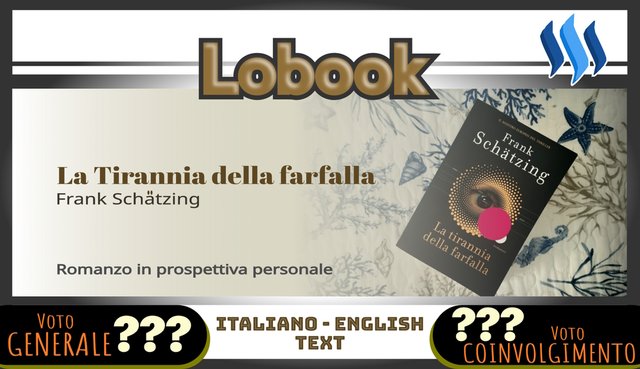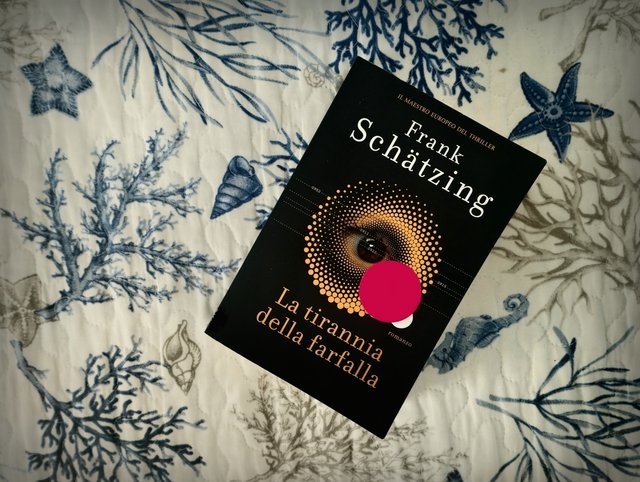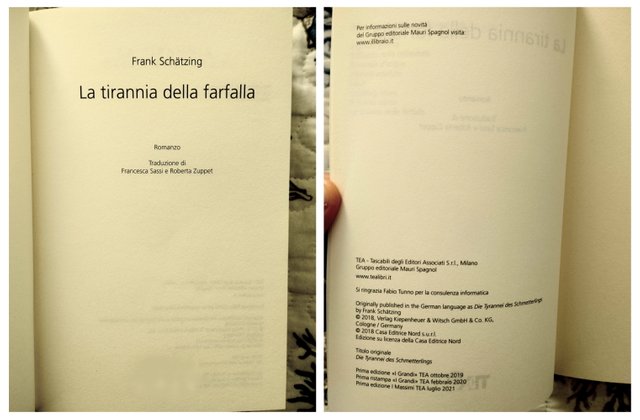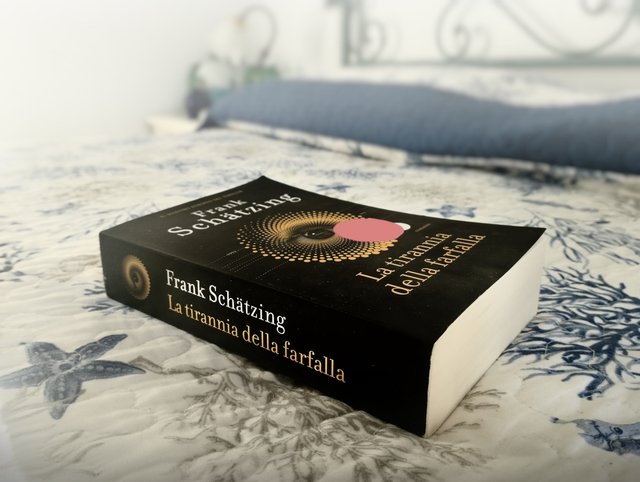#LOBOOK - Leggendo "La tirannia della farfalla" [di Frank Schätzing | ITA-ENG]
Ogni uso dei contenuti presenti in questo post – e/o di ogni loro derivato – è proibito senza esplicito consenso dell'autore, a eccezione della diffusione senza modifiche attraverso canali media e social media.
Questo post non ha finalità promozionale.

Ciao!
Oggi pubblico un post inerente la mia iniziativa #lobook. In breve, qui condivido la mia esperienza riguardo a un libro, iniziando dall'acquisto e terminando con la mia personale recensione. Puoi trovare qualcosa in più sull'argomento lobook, consultando il mio primo Lobook post qui su Steemit.
E ORA INIZIAMO!
Questo nuovo episodio prende ispirazione dal romanzo di Frank Schätzing, pubblicato con il titolo Die Tyrannei des Schmetterlings (2018). La traduzione italiana che io ho letto è La tirannia della farfalla, curata da Francesca Sassi e Roberta Zuppet. La prima pubblicazione in Italia risale al 2018. Nell'immagine sottostante, puoi trovare un'immagine con la copertina da cui ho rimosso alcune parti, provando a evitare possibili pubblicità dirette.

E qui sotto, ecco alcuni scorci delle pagine all'interno:

Ho acquistato il libro alcuni mesi fa in formato tascabile. Ci sono diverse edizioni dai prezzi disparati, maggiori per le versioni in copertina rigida e minori per quelle a copertina morbida. Tralasciando le varie promozioni possibili (considerando soltanto il prezzo di copertina ufficiale) la fascia di prezzo in cui è possibile reperire questo libro al momento in Italia varia tra €12,90 e €22,00. Nel paese dove vivo, abbiamo anche una versione in ebook per i lettori in digitale ad un prezzo ancora più economico.

SFOGLIANDO LE PAGINE
Anni prima, si prepara alla battaglia. Rimane in agguato, pronto a colpire. Il destino di quelle terre deve cambiare, e loro saranno i protagonisti di quel cambiamento. Ma qualcosa che non doveva esserci lo colpisce all'improvviso. Qualcosa che nessuno ha mai visto prima.
Oggi, la vita quotidiana di uno sceriffo scorre come al solito, tra mille impegni e disavventure. Fino a che non viene coinvolto in qualcosa che va al di là di ogni comprensione, o almeno così all'apparenza. Invece, tutto è connesso.
Non è il primo libro di Schätzing che leggo. Normalmente li apprezzo, ma questo non mi ha convinto. Andiamo per gradi. Ho trovato la prima parte interessante: non ricca di eventi utili a creare suspense, ma abbastanza da narrare in maniera accettabile ciò che accade. Da quando la trama entra nel vivo, lo stile di narrazione inizia a giocare un ruolo fondamentale: o riesci a seguirlo, o non ci riesci. Nel mio caso, non ci sono riuscito. Dopo la prima parte, man mano che ci si sposta verso il finale, aumentano i momenti riflessivi descritti in maniera molto astratta, dai mille e nessuno significati possibili. In questi momenti non riuscivo a creare un'immagine della situazione descritta e alla lunga ciò mi ha portato a perdere svariate porzioni di romanzo. Ho avuto lo stesso problema anche a causa dell'utilizzo di riflessioni in prima persona all'interno del racconto in terza, senza nessuna segnalazione. Non so se è un errore o è stato fatto volutamente, ma mi è capitato in più occasioni di dover tornare indietro per capire dove finiva la narrazione e dove iniziava il pensiero personale all'interno dello stesso paragrafo.
La trama presa singolarmente potrebbe anche essere avvincente, sebbene mi sia sembrata non troppo originale. Mi è sembrato un contenuto molto simile a trame di film usciti negli ultimi 20 anni trattanti il tema dell'intelligenza artificiale, soltanto riscritto e riproposto in maniera differente sfruttando un libro. Il finale, scritto nel modo in cui è stato scritto – per quanto personalmente mi piaccia quel modo – mi ha ricordato troppo una manciata di film di fantascienza che ho visto negli ultimi tempi. Se il libro fosse stato ideato molti anni fa, il mio parere in fatto di originalità cambierebbe, ma controllando l'anno di pubblicazione ho confermato la mia impressione.
Il romanzo non è secondo me sconsigliato, sebbene non dalla trama troppo originale per chi mastica il genere con protagonista l'intelligenza artificiale e le implicazioni di un suo utilizzo massivo. Diciamo che reputo però questo romanzo poco indicato per lettori che amano la narrazione pragmatica, quella asciutta che magari usa degli artifici narrativi ma che non lascia mai divagare la fantasia con frasi o riflessioni dalle mille interpretazioni possibili. Se invece questo tipo di narrazione piace, e si è magari nuovi al genere e alle tematiche trattate, nulla da obiettare: penso che valga la pena leggerlo. Io rientro - ahimé – nella prima categoria.

VALUTAZIONE PERSONALE
Per la mia personale valutazione del libro, uso di solito due tipi di voto: un VOTO GENERALE, basato su un approccio più obiettivo al testo (dove considero per esempio il modo di scrivere dell'autore, la trama, gli errori riscontrati, eccetera), e un VOTO COINVOLGIMENTO, basato invece sulle sensazioni che mi ha trasmesso (se mi ha attratto, se mi ha intrigato e invogliato nella lettura, se mi ha lasciato informazioni utili, eccetera). Ognuno dei due voti viene contrassegnato da un numero di stelle che va dal minimo di 1 al massimo di 5.
Nel caso de La tirannia della farfalla, il mio personale responso è
- Voto generale: 3 stelle
- Voto coinvolgimento: 2 stelle

Se questo articolo ti ha incuriosito, puoi trovare info cercando online notizie dell'autore, oppure rivolgerti a rivenditori del settore. Io ti saluto e spero di averti lasciato un'opinione utile. Periodicamente pubblicherò altri articoli di questo genere. Se ti interessa scoprire nuovi libri sul mercato – principalmente romanzi –, puoi continuare a seguirmi sul tag #lobook.
Un saluto e al prossimo libro!

Questo post partecipa al progetto sperimentale Penny4thoughts.
Below, the ENGLISH translation I previously published on Blurt..
Every use of the contents herein - and/or each derivative - is prohibited without the explicit consent of the author, except for dissemination without modification trough media and social media channels.
This post doesn't have a promotional purpose.

Hello!
Today I publish a post about my #lobook initiative. Here, I share my experience about a book, beginning from the buying and finishing with my personal review. You can read more about lobook, consulting my first Lobook post here on Steemit.
AND NOW, LET'S GO!
This new episode takes a cue from the Frank Schätzing's novel, published with the title Die Tyrannei des Schmetterlings (2018). The Italian translation I read is La tirannia della farfalla, curated by Francesca Sassi and Roberta Zuppet. The first publication in Italy dated back to 2018. In the image below, you can see a cover picture from which I removed a few parts, trying to avoid possible direct advertisings.

And below, some slices of the inner pages:

I bought the book a few months ago in paperback format. There are several editions with different prices, major for the hard-cover version and minor for the softcover one. Excluding various discounts applied (and instead considering only the official cover price) the price range with which I found the book at the moment varies approximately from €12.90 to €22.00. Here in Italy, we have also an e-book format for digital readers.

TURNING PAGES
Years earlier, he prepares for battle. He remains in ambush, ready to strike. The fate of those lands must change, and they will be the protagonists of that change. But something that shouldn't have been there hits him suddenly. Something no one has ever seen before.
Today, the daily life of a sheriff flows as usual, with a thousand commitments and misadventures. Until he gets involved in something that is beyond all comprehension, or so it appears. Instead, everything is connected, and he will notice.
It's not the first Schätzing's book I've read. Normally I appreciate them, but this one didn't convince me. Let's go step by step. I found the first part interesting: not full of events useful to create suspense, but enough to narrate what happens in an acceptable way. From the moment the plot comes to life, the storytelling style begins to play a fundamental role: you can follow it, or you can't. In my case, I failed. After the first part, as I move towards the end, the meditation moments described in a very abstract way increase, with a thousand and no possible meanings. In these moments I couldn't create an image of the situation described, and, in the long run, this led me to lose several portions of the novel. I also had the same problem due to the use of first-person meditations within the third-person story, without any sign that makes this passage understandable. I don't know if it's a mistake or if it was done on purpose, but I was forced to go back several times to understand where the narration ended and where the personal thought began within the same paragraph.
The plot (considered without any other element) could also be compelling, although it seemed to me not too original. It seemed to me this is a content very similar to the plots of films released in the last 20 years dealing with the theme of artificial intelligence, only rewritten and re-proposed in a different way using a book. The ending, written the way it was written - as much as I personally like it that way - reminded me too much of a handful of sci-fi movies I've seen lately (and which are not so recent). If the book had been conceived many years ago, my opinion of originality would change, but checking the year of publication confirmed my impression.
In my opinion, the novel isn't to be discarded, although not with a too original plot for those who know the genre starring artificial intelligence and the implications of its massive use. Let's say, however, that I think this novel isn't very suitable for readers who love a pragmatic narration, the dry one that perhaps uses narrative devices but never lets the imagination wander with sentences or meditations with a thousand possible interpretations. If, on the other hand, you like this type of narration, and you are perhaps new to the genre and the topics covered, there is no objection: I think it is worth reading. Unluckily, I am in the first category.

PERSONAL RATING
For my personal rating of the book, I usually use two votes: a GENERAL VOTE, based on a more objective approach to the text (where I consider for example the author's way of writing, the plot, any errors found, etc), and an INVOLVEMENT VOTE, based instead on the effect that reading had on me (if it attracted me, if it intrigued and tempted me, if it gave me useful information, etc.). Each of the two ratings is marked with a number of stars, from one to 5.
In the case of La tirannia della farfalla, my personal response is:
- General vote: 3 stars
- Involvement vote: 2 stars

If this article has intrigued you, you can find info by searching on the web for news of the author, or contacting retailers in the books business sector. I greet you, and I hope my one is a useful opinion. I will periodically publish other posts of this kind. If you are interested in discovering new books – mainly novels – on the market, you can continue following me on the #lobook tag.
A greeting and to the next book!

This post join the Penny4thoughts experimental project.
Thank you, friend!


I'm @steem.history, who is steem witness.
Thank you for witnessvoting for me.
please click it!
(Go to https://steemit.com/~witnesses and type fbslo at the bottom of the page)
The weight is reduced because of the lack of Voting Power. If you vote for me as a witness, you can get my little vote.
Thanks for supporting @se-witness with your witness vote. Heres a free vote!